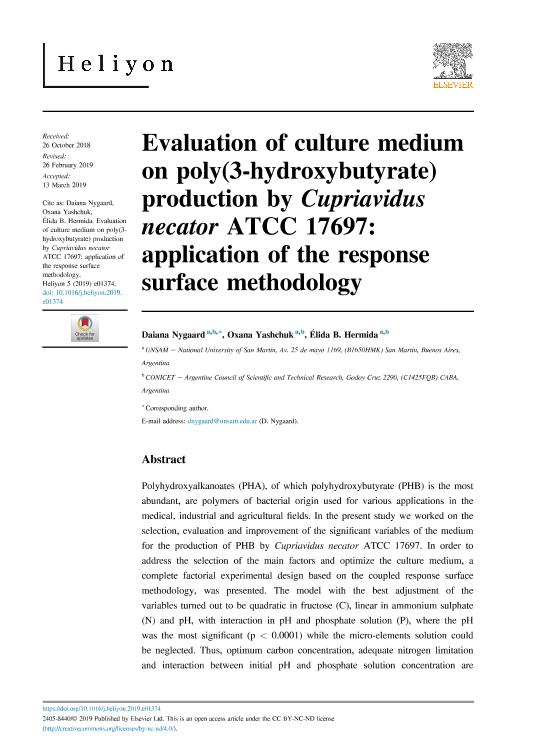Mostrar el registro sencillo del ítem
dc.contributor.author
Nygaard, Daiana

dc.contributor.author
Yashchuk, Oxana

dc.contributor.author
Hermida, Elida Beatriz

dc.date.available
2021-01-12T18:52:36Z
dc.date.issued
2019-03
dc.identifier.citation
Nygaard, Daiana; Yashchuk, Oxana; Hermida, Elida Beatriz; Evaluation of culture medium on poly(3-hydroxybutyrate) production by Cupriavidus necator ATCC 17697: application of the response surface methodology; Elsevier; Heliyon; 5; 3; 3-2019; 1-18
dc.identifier.issn
2405-8440
dc.identifier.uri
http://hdl.handle.net/11336/122527
dc.description.abstract
Polyhydroxyalkanoates (PHA), of which polyhydroxybutyrate (PHB) is the most abundant, are polymers of bacterial origin used for various applications in the medical, industrial and agricultural fields. In the present study we worked on the selection, evaluation and improvement of the significant variables of the medium for the production of PHB by Cupriavidus necator ATCC 17697. In order to address the selection of the main factors and optimize the culture medium, a complete factorial experimental design based on the coupled response surface methodology, was presented. The model with the best adjustment of the variables turned out to be quadratic in fructose (C), linear in ammonium sulphate (N) and pH, with interaction in pH and phosphate solution (P), where the pH was the most significant (p < 0.0001) while the micro-elements solution could be neglected. Thus, optimum carbon concentration, adequate nitrogen limitation and interaction between initial pH and phosphate solution concentration are important factors to ensure a high production of PHB. The optimal values of the selected variables were C = 20 g/l, N = 1.5 g/l, P = 8.75 g/l and pH 7.5. A maximum PHB production of 4.6 g/l, obtained under these conditions, increased almost 2.5 times. The polymer accumulated in the cytoplasm of C. necator ATCC 17697 in the form of granules showed an FTIR spectrum corresponding to that of commercial PHB.
dc.format
application/pdf
dc.language.iso
eng
dc.publisher
Elsevier

dc.rights
info:eu-repo/semantics/openAccess
dc.rights.uri
https://creativecommons.org/licenses/by-nc-nd/2.5/ar/
dc.subject
Cupriavidus necator
dc.subject
PHA
dc.subject
biodegradable polymer
dc.subject
fermentation
dc.subject
Mathematical biosciences
dc.subject
Microbiology
dc.subject.classification
Bioproductos, Biomateriales, Bioplásticos, Biocombustibles, Bioderivados, etc.

dc.subject.classification
Biotecnología Industrial

dc.subject.classification
INGENIERÍAS Y TECNOLOGÍAS

dc.title
Evaluation of culture medium on poly(3-hydroxybutyrate) production by Cupriavidus necator ATCC 17697: application of the response surface methodology
dc.type
info:eu-repo/semantics/article
dc.type
info:ar-repo/semantics/artículo
dc.type
info:eu-repo/semantics/publishedVersion
dc.date.updated
2021-01-08T14:16:22Z
dc.journal.volume
5
dc.journal.number
3
dc.journal.pagination
1-18
dc.journal.pais
Países Bajos

dc.description.fil
Fil: Nygaard, Daiana. Universidad Nacional de San Martín. Escuela de Ciencia y Tecnología; Argentina. Consejo Nacional de Investigaciones Científicas y Técnicas; Argentina
dc.description.fil
Fil: Yashchuk, Oxana. Universidad Nacional de San Martín. Escuela de Ciencia y Tecnología; Argentina. Consejo Nacional de Investigaciones Científicas y Técnicas; Argentina
dc.description.fil
Fil: Hermida, Elida Beatriz. Universidad Nacional de San Martín. Escuela de Ciencia y Tecnología; Argentina. Consejo Nacional de Investigaciones Científicas y Técnicas; Argentina
dc.journal.title
Heliyon
dc.relation.alternativeid
info:eu-repo/semantics/altIdentifier/url/https://www.sciencedirect.com/science/article/pii/S2405844018370701
dc.relation.alternativeid
info:eu-repo/semantics/altIdentifier/url/https://www.ncbi.nlm.nih.gov/pmc/articles/PMC6441750/
dc.relation.alternativeid
info:eu-repo/semantics/altIdentifier/doi/https://doi.org/10.1016/j.heliyon.2019.e01374
Archivos asociados
